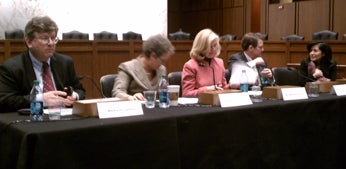Wallace Hosts Capitol Hill Briefing on School Leadership

Panelists at Capitol Hill briefing (l to r): Michael Copland, Linda Darling-Hammond, M. Christine DeVita (moderator); Paul Pastorek, and Alexandra Anormaliza.
The nation won't achieve its goals for student success without more attention to preparing and supporting school principals. That was the clear message from expert panelists at a March 30 briefing on Capitol Hill sponsored by The Wallace Foundation. To read a one-page summary of key discussion points and federal policy implications, click here.
About 80 people attended the one-hour briefing, "The Principal Factor in School Improvement: Federal Policy Implications," held in the dignified setting of hearing room 216 of the Hart Senate Office Building that has seen Supreme Court justice confirmation hearings. Attending the briefing were 23 Congressional staffers and numerous representatives from influential education policy organizations.
The briefing, whose honorary cosponsors included U.S. Sen. Mike Enzi, R-WY, U.S. Sen. Tom Harkin, D-IA, and U.S. Rep. Susan Davis, D-CA, highlighted 10 years of research and work by The Wallace Foundation with 24 states and school districts across the country to strengthen school leadership. Click here to read a synthesis of lessons learned by the foundation.
The report was also covered in a blog post in Education Week and in a story in The Washington Times.
Wallace President M. Christine DeVita moderated the expert panel that included Linda Darling-Hammond, the Charles E. Ducommun professor of education at Stanford University, Michael Copland, associate professor in leadership at the University of Washington, Paul Pastorek, the state superintendent of education in Louisiana, and Alexandra Anormaliza, who had been principal of International High School in Brooklyn and is now executive director of the Office of Achievement Resources at the New York City Department of Education.
DeVita noted that while policymakers are paying a great deal of attention to teachers, there is no documented instance of a troubled school being turned around without effective principals. "We haven't given it the careful attention it deserves," she noted. Effective school leadership, she said, is second only to teaching to improve student achievement. Research shows that making sure that schools have good principals is a cost-effective strategy because "one principal can shape the work of many teachers."
DeVita pointed out that principal training has been a "stepchild" in education schools and asked the panel: What can we do to get effective principals into schools?
Darling-Hammond noted that the United States is the only nation without a national policy on the preparation of teachers and school leaders and said policymakers could offer incentives to encourage advanced certification for principals and challenge grants to universities and school districts. Policymakers, she said, also could provide funding for internships such as those in Mississippi and North Carolina and could invest in state leadership academies, among other steps. "We need a West Point for educational leaders," she said. She also noted that we need to support great programs with stronger outcomes and programs that proactively select or "tap" candidates among dynamic teachers.
Pastorek said the state role is changing rapidly and that states have a key role in supporting more effective training of school principals both through money and regulatory oversight. He said that states can direct funding to effective programs and away from ineffective ones, and can encourage district policies, including careful mentoring of new principals. Pastorek also noted from his experience that there is a lack of rigor in understanding what makes a good principal and what it takes for them to be effective. Using examples from Louisiana, Pastorek suggested how to improve principal evaluation, suggesting that it be based both on competencies and student outcomes.
Copland said that if districts are properly supported, they could be the agents of change in education. His research suggests that districts can do a better job by focusing on the primary business of schools – teaching and learning – and on the success of principals who are crucial to school improvement. Districts need to find their role in developing and supporting principals. Successful districts identify and support school leaders and hire graduates from strong programs. Smart districts also assign effective principals where they are most needed. He also suggested that districts staff the personnel function in central offices with people who understand teaching and learning. Districts need to differentiate support to schools and work with a range of principals to support their work. Copland said that federal policies need to embrace that the districts are key in this work and that federal money should support their role in developing and supporting principals.
Anormaliza said the principal's role has become extremely challenging. Principals, she noted, should have a network of support and the ability to work in teams to learn and improve. "Principals are expected to be instructional leaders, CEOs, data specialists, parents, social workers, and generally all things to all people," she said. "Our national demand that all students achieve has made the principal directly responsible for making that happen. However, the immense responsibility placed on a principal's shoulders, coupled with the myriad compliance-related requests from the federal, state, and local governments make the job almost undoable." Anormaliza lauded her training at the New York City Leadership Academy which incorporated many of the recommendations in Darling-Hammond's report, crediting it with helping her double the number of graduates of English Language Learners compared to city norms. Good leadership and good teaching go hand-in-hand, she said: "if we want to invest in our teaching corps, we also have to invest in our school leaders."
